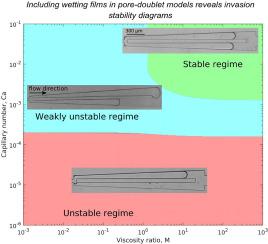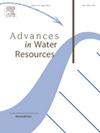Impact of wetting films on the stability of two-phase flow in porous media: A pore-doublet perspective
IF 4.2
2区 环境科学与生态学
Q1 WATER RESOURCES
引用次数: 0
Abstract
Two-phase flow stability in porous media depends on a complex interplay between surface tension effects and viscous forces. We investigate the role of wetting films on the stability of two-phase flow during drainage. Such films are ubiquitous in porous media and are deposited at the solid walls and corners after the passage of the meniscus. We derive a novel dynamic pore-doublet model with identical channels that includes the effects of lubricating films. Direct comparisons with microfluidic experiments highlight that neglecting wetting films in pore-doublets analysis leads to significant prediction errors. We demonstrate that pore-doublet models with wetting films reproduce stability phase diagrams similar to the so-called Lenormand diagrams. At high viscosity ratios, our model predicts phase transition between stable, viscous, and capillary fingering regimes that agree very well with Lenormand phase diagrams obtained using complex porous structures. Our study demonstrates that using simple systems, such as pore doublets with lubricating films, allows us to capture the non-linear response of two-phase flow stability similar to those observed in complex pore networks.

润湿膜对多孔介质中两相流稳定性的影响:双孔视角
多孔介质中两相流的稳定性取决于表面张力效应和粘性力之间复杂的相互作用。研究了疏水过程中润湿膜对两相流稳定性的影响。这种膜在多孔介质中普遍存在,并在通过半月板后沉积在固体壁和角落。我们推导了一种新的具有相同通道的动态双孔模型,其中包括润滑膜的影响。与微流体实验的直接比较表明,在孔偶分析中忽略润湿膜会导致显著的预测误差。我们证明了具有润湿膜的双孔模型再现了类似于所谓的Lenormand图的稳定性相图。在高粘度比下,我们的模型预测了稳定、粘性和毛细管指指制度之间的相变,这与使用复杂多孔结构获得的Lenormand相图非常吻合。我们的研究表明,使用简单的系统,如具有润滑膜的孔双孔,使我们能够捕获两相流稳定性的非线性响应,类似于在复杂孔网络中观察到的响应。
本文章由计算机程序翻译,如有差异,请以英文原文为准。
求助全文
约1分钟内获得全文
求助全文
来源期刊

Advances in Water Resources
环境科学-水资源
CiteScore
9.40
自引率
6.40%
发文量
171
审稿时长
36 days
期刊介绍:
Advances in Water Resources provides a forum for the presentation of fundamental scientific advances in the understanding of water resources systems. The scope of Advances in Water Resources includes any combination of theoretical, computational, and experimental approaches used to advance fundamental understanding of surface or subsurface water resources systems or the interaction of these systems with the atmosphere, geosphere, biosphere, and human societies. Manuscripts involving case studies that do not attempt to reach broader conclusions, research on engineering design, applied hydraulics, or water quality and treatment, as well as applications of existing knowledge that do not advance fundamental understanding of hydrological processes, are not appropriate for Advances in Water Resources.
Examples of appropriate topical areas that will be considered include the following:
• Surface and subsurface hydrology
• Hydrometeorology
• Environmental fluid dynamics
• Ecohydrology and ecohydrodynamics
• Multiphase transport phenomena in porous media
• Fluid flow and species transport and reaction processes
 求助内容:
求助内容: 应助结果提醒方式:
应助结果提醒方式:


